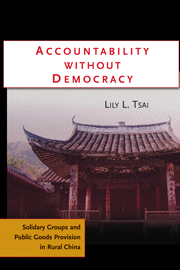Book contents
- Frontmatter
- Contents
- List of Figures
- List of Tables
- Acknowledgments
- 1 GOVERNANCE AND INFORMAL INSTITUTIONS OF ACCOUNTABILITY
- 2 DECENTRALIZATION AND LOCAL GOVERNMENTAL PERFORMANCE
- 3 LOCAL GOVERNMENTAL PERFORMANCE
- 4 INFORMAL ACCOUNTABILITY AND THE STRUCTURE OF SOLIDARY GROUPS
- 5 TEMPLES AND CHURCHES IN RURAL CHINA
- 6 LINEAGES AND LOCAL GOVERNANCE
- 7 ACCOUNTABILITY AND VILLAGE DEMOCRATIC REFORMS
- 8 THE LIMITATIONS OF FORMAL PARTY AND BUREAUCRATIC INSTITUTIONS
- 9 CONCLUSION
- References
- Appendix: Additional Notes on Survey Sampling and Data Analysis
- Index
- Cambridge Studies in Comparative Politics
7 - ACCOUNTABILITY AND VILLAGE DEMOCRATIC REFORMS
Published online by Cambridge University Press: 05 June 2012
- Frontmatter
- Contents
- List of Figures
- List of Tables
- Acknowledgments
- 1 GOVERNANCE AND INFORMAL INSTITUTIONS OF ACCOUNTABILITY
- 2 DECENTRALIZATION AND LOCAL GOVERNMENTAL PERFORMANCE
- 3 LOCAL GOVERNMENTAL PERFORMANCE
- 4 INFORMAL ACCOUNTABILITY AND THE STRUCTURE OF SOLIDARY GROUPS
- 5 TEMPLES AND CHURCHES IN RURAL CHINA
- 6 LINEAGES AND LOCAL GOVERNANCE
- 7 ACCOUNTABILITY AND VILLAGE DEMOCRATIC REFORMS
- 8 THE LIMITATIONS OF FORMAL PARTY AND BUREAUCRATIC INSTITUTIONS
- 9 CONCLUSION
- References
- Appendix: Additional Notes on Survey Sampling and Data Analysis
- Index
- Cambridge Studies in Comparative Politics
Summary
Previous chapters have shown how encompassing and embedding solidary groups can provide informal institutions that increase the accountability of village officials to citizens. Informal institutions, however, may have limitations. Officials may decide not to participate in these institutions when they have other political resources. Dependence on informal institutions may also be dangerous. They may come to replace the state, rather than just reinforcing it. They may reduce incentives for the central government, local officials, and citizens to invest in strengthening formal state institutions for local public goods provision, thereby limiting the level of provision to lower than it would be under different arrangements that enable localities to take full advantage of the state's resources.
If informal institutions of accountability have potential pitfalls, what about the implementation of democratic institutions for village governance? Many see free and fair elections as at least a partial solution for unresponsive and corrupt governments. If only citizens had the power to choose their own candidates for office and vote them out of power for poor performance, then there would be accountability and better governance. It was with these hopes that the Chinese central government, faced with the deteriorating quality of rural governance, introduced a series of grassroots democratic reforms in 1988 that included elections for village officials.
Since then, much of the research on rural China has focused on these village elections – figuring out how democratic they are, what makes villages more likely to implement them, and how likely they are to extend to higher levels of government.
- Type
- Chapter
- Information
- Accountability without DemocracySolidary Groups and Public Goods Provision in Rural China, pp. 187 - 227Publisher: Cambridge University PressPrint publication year: 2007
- 1
- Cited by

